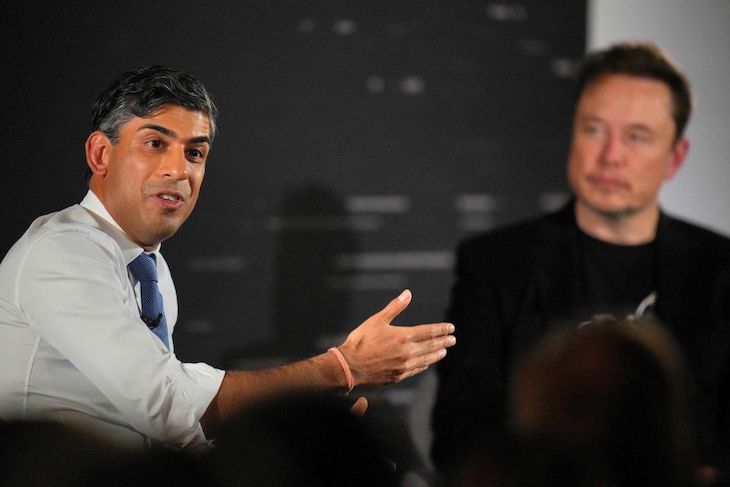It was hard to enjoy Rishi Sunak’s sit down with Elon Musk on stage at Lancaster House last night. It was hard to hate it, too. We saw two men, two different types of nerd, talking about how artificial intelligence can be good or bad, and how science fiction is a useful guide to this coming reality. They said that AI might provide companionship, make us all redundant, or chase us up the stairs. The language was dramatic – Musk called AI ‘the most disruptive force in human history’ – but the talk was essentially banal. We’ve all had pretty much the same conversation a thousand times this year.
Sunak never sounds entirely comfortable, but he seemed touchingly excited to be talking to Elon, king of the autists, on this big subject at his big ‘Business Connect’ summit.
It was amiable and benign, even as the two men discussed the possible end of human functionality. Sunak started by telling Musk that ‘Bill Gates said there is no one in our time who has done more to push the bounds of science and innovation and you.’ Musk said that Sunak’s AI safety conference ‘will go down in history as being very important.’ Musk was kind enough to say the United Kingdom and London were ‘objectively’ very well placed to take advantage of the opportunities which AI presents.
Sunak never sounds entirely comfortable
They got their plugs in. Musk said his Tesla cars were ‘robots with wheels.’ Rishi said the British government built gov.uk to centralise human contact with the machinery of state.
Rishi used lots of buzz phrases – ‘a co-pilot’, ‘human agency’, ‘the landscape of things’, ‘wisdom of crowds’ – while Musk used high-minded analogies about sports, gardens, companionship, and ‘vectors’.
The PM said that, as a politician, ‘part of our job is to navigate towards that largely positive place’ and asked Elon about the thing he’s ‘most excited about…education.’ He asked about Sal Khan’s Ted talk – no surprise that Sunak watches Ted Talks – on how AI can be ‘an amazing personal tutor’ for every child. But that didn’t quite address the problem Musk was getting at, which is that, if machines are more intelligent than any human, what will drive people to learn anything at all? Musk suggested that human competitiveness could always mean that humans want to ‘be the best human’ and Rishi talked about work giving people purpose and meaning.
Speaking about X, Musk talked about the need to stay ‘true to the truth…I think actually truth pays’ which could have led into an interesting discussion about the moral foundations upon which humans should build intelligent machines. But then came the questions – from business people – and we got back to more corporate conference talk about ‘regulatory guardrails…innovation…unlocking growth equity.’
Sunak is fond of saying ‘my job is to make sure…’ and that makes him sound sort-of humble in a not-at-all way. But it also suggests that he isn’t entirely sure what his job really is. Is he a statesman, a political leader, or a CEO-type of the United Kingdom, which he sees as a kind of national ‘WeWork’ centre to give people what he would call the ‘tools’ to succeed.
Sunak said the tough part will be transposing the ‘culture’ of Silicon Valley, where people are comfortable failing and brave enough to start-up start-ups. This is all very familiar, and very brand Rishi, long-term decisions for his probably short-term political future. It’s all very inoffensive. But is it leadership? Most British people would rather just be able to see their GP if they need to, which in this brave new world seems increasingly impossible.







Comments